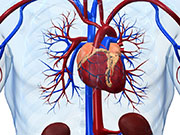- Could Your Grocery Store Meat Be Causing Recurring UTIs?
- Are You Making This Expensive Thermostat Error This Winter?
- Recognizing the Signs of Hypothyroidism
- 10 Strategies to Overcome Insomnia
- Could Artificial Sweeteners Be Aging the Brain Faster?
- Techniques for Soothing Your Nervous System
- Does the Water in Your House Smell Funny? Here’s Why
- Can a Daily Dose of Apple Cider Vinegar Actually Aid Weight Loss?
- 6 Health Beverages That Can Actually Spike Your Blood Sugar
- Treatment Options for Social Anxiety Disorder
Study Gauges Value of CT Scans for Heart Patients


In the first head-to-head study of its kind, researchers say that CT scans may offer some advantages over traditional “functional stress tests” for people with symptoms of heart disease.
As explained in a news release from the American College of Cardiology (ACC), a heart CT scan gives doctors 3-D images that they can use to assess the degree of narrowing in the heart’s arteries.
A functional test uses electrical signals, sound waves or imaging to monitor the heart’s response to stress, the ACC said.
Both CT scans and functional tests are widely used but have never before been compared head-to-head in terms of patient outcomes, according to a team led by Dr. Pamela Douglas, a heart disease expert at Duke University in Durham, N.C.
In the new study, Douglas and colleagues tracked outcomes for more than 10,000 patients with suspected heart disease who were tested at 193 health centers in the United States and Canada. Half of them underwent heart CT scans and half were assessed with functional tests.
Over two years of follow-up, about 3 percent of patients in both groups had a heart attack, required tests or procedures for chest pain, or died, the researchers found. However, CT scans appeared to be better than functional tests at ruling out the need for subsequent tests and procedures in patients without heart disease.
The study was to be presented Saturday in San Diego at the annual meeting of the ACC, and was also published online March 14 in the New England Journal of Medicine.
The findings are important, the researchers said, because there are no firm guidelines for doctors on which tests should be given to patients with heart disease symptoms such as chest pain and shortness of breath. There are at least 4 million such patients cared for in the United States each year, the study authors said.
“Until this study, we have essentially been guessing on decisions about which initial test to use for this huge population of patients who need evaluation for cardiovascular symptoms,” Douglas said in the news release.
“Our study shows that the prognostic outcomes are excellent and are similar regardless of what type of test you use, but there are some indications that [CT] might be the safer test,” because it was tied to fewer unnecessary procedures and lower amounts of radiation, she explained.
But what about differences in cost between the two testing methods?
Another study presented this weekend at the ACC meeting addressed that question. Researchers led by Dr. Daniel Mark of Duke University’s Heart Center compared CT to functional testing in over 10,000 patients with chest pain.
They found that the average CT scan cost $404, an echocardiogram cost about $514, and a stress-test ECG was only $174. And because CT scans often pointed to the need for further procedures, its use added an additional average of $280 to medical bills incurred within the next three months. By two years later, however, the gap in cost had shrunk to just $30, the researchers found.
In an ACC news release, Mark said that “these differences in cost are not statistically significant and the surgeries may well have improved the survival of the people who received them.” His team’s study was funded by the U.S. National Institutes of Health.
More information
The U.S. National Heart, Lung, and Blood Institute has more about heart CT.
Source: HealthDay
Copyright © 2026 HealthDay. All rights reserved.










